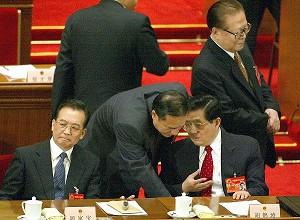With just 8 months until the Seventeenth Party’s Congress, the power struggle inside the Chinese communist regime has developed into a life and death battle between the two factions led by Hu Jintao and former leader Jiang Zemin.
Targeting one another’s factions to weaken and dismantle the other’s power is not a simple game of battleships.
Recently, the “Shanghai faction,” led by former regime head Jiang Zemin, encountered a series of setbacks led by Hu:
Standing Political Bureau Member Looses Position
First, Shanghai Party Chief Chen Liangyu was sacked, then Standing Member of the Political Bureau, Huang Ju was forced to hand over control of the finance sector. Huang did not show up at the recent National Financial Working Meeting. His power had already been handed over to Premier Wen Jiabao, while the chief in Huang Ju’s Office, Wang Wei, was also sacked, and put under house arrest to “confess his problem.” Wang was once deputy secretary-general of the Shanghai Municipal Party Committee.
According to the Hong Kong Economic Times, the regime stated, “because of Huang’s chronic health problems, he could no longer continue to work. Since he had officially stopped working he handed over his power of the finance sector.”
Usually, people at the regime’s top level never hand over power; unless it is to people they themselves have chosen. Huang lost his power not because of his health; it is the end of his political career and clearly shows that his “boss,” former leader Jiang Zemin, could no longer protect him.
Next Target: Jiang Mianheng
Not long ago, Hu mentioned Chen Liangyu’s case during his speech at the Seventh Plenary Meeting of the Central Discipline Committee. Soon after that, the secretary-general of the Shanghai Municipal Party Committee Fan Deguan was put under “investigation;” Fan was Chen’s close assistant, and he is currently the highest ranking official to have fallen in Shanghai because of the social security fund embezzlement case after Chen’s arrest.
It shows that Hu had the intention to clean up Jiang Zemin’s “Shanghai Faction” using the social security fund embezzlement investigation as the catalyst.
Hu’s target is still aiming higher and closer to Jiang Jemin. Currently, negative news regarding Jiang Zemin’s eldest son Jiang Minaheng began to show up on China’s internet. People in Shanghai are being encouraged to report any questionable activities involving Jiang Mianheng. And once again, Shanghai tycoon Zhou Zhengyi, who has close ties with Jiang’s faction, was also arrested.
According to an Open Magazine report, the Central Discipline Committee has already obtained direct evidence of land embezzlement activities involving Jiang Zemin’s two sons.
Chinese rights lawyer Zheng Enchong, who has been devoted for the past several years to exposing Zhou Zhengyi’s involvement in the land embezzlement case, also published articles on the Internet indicating that people have provided him with a trove of information regarding Jiang Zemin’s two sons’ land embezzlement activities.
Hu’s Greatest Challenge—the Military
According to Open Magazine, Hu already has sufficient political assets deployed in the Seventeenth Party’s Congress to retain his power. Last year, Hu managed to put his people in the No.1 leadership positions in 14 provincial and municipal levels. Hu will also have sufficient control to make decisions for another 17 provincial and municipal levels before June 2007.
Despite all this success, Hu has only limited control over the military, where Jiang still has the most influence.
According to The Trend magazine (November 2006), Hu nearly died in an attempted assassination when he secretly visited a navy base in Qingdao, Shangdong Province in May 2006. It has been difficult to verify the report, but circumstantial evidence continues to surface supporting the speculation; such as Hu’s removal of almost all officials in Qingdao, sacking Deputy Navy General Commander Wang Shouye, and releasing Jiang’s deadly enemy Chen Xitong from jail. China issue experts also believe the unsuccessful assassination triggered Hu to strike out at Chen Liangyu, which revealed the deepening factional war between Hu and Jiang Zemin.
On January 1, 2007, Hong Kong Mingpao News also disclosed that both the Commander and Political Commissioner for the Beijing Garrison Military District were changed in late 2006. According to China Affair editor Wu Fan, this was done by Hu to prevent a coup.
Hu also issued five documents between the end of November and mid-December 2006, stressing his party’s absolute leadership over the army, according to Chengming Magazine’s January 2007 issue.
However, Hu is often challenged by the military. The Chinese military’s sudden satellite destruction test raised wide international concerns, and the slow response from the regime’s Ministry of Foreign Affairs showed that Hu is still not in the decision making loop.
From the nuclear threat by major general Zhu Chenghu in 2005 to the recent satellite destruction test, the military continues using patriotism as an excuse to damage Hu’s international image, which is one of advocating a peaceful China. Jiang wants to show Hu that “the military is not in your hand.”
Sooner or later, there will be a decisive battle between Hu and Jiang, and judging from the current situation, it’s not far away.
